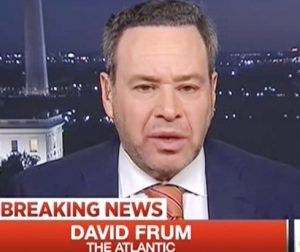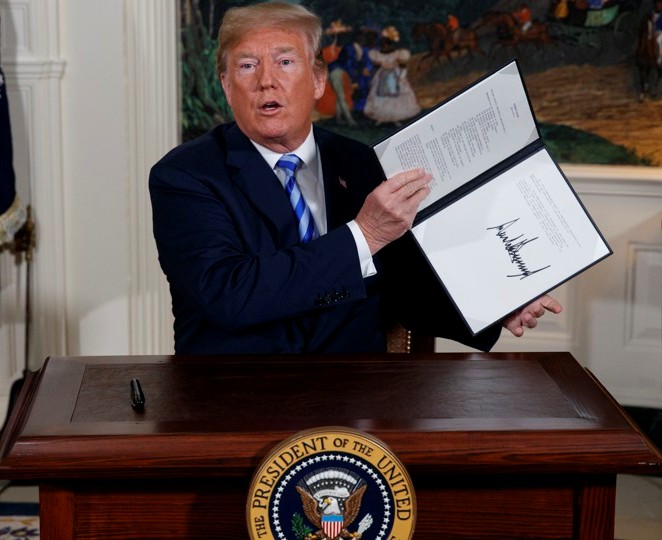When President Donald Trump tore the negotiated Iran Nuclear deal last Tuesday by pulling out of it, what was he doing, what are the possible implications of his action and how might the world handle them? Two views here point the way in the first of a two-part series. Although the views are from American based media platforms that can be labelled as status quo inclined, both think very much alike in terms of the crisis provoking potentials of President Trump’s move. Jacob Heilbrunn, the author of the first piece, “Is Trump Starting a War With Iran?” is the editor of The National Interest while David Frum, the author of the second piece below “The Three Crises Sparked by Trump’s Withdrawal From the Iran Deal” was a White House presidential speech writer. His piece was published in The Atlantic, (May 8th, 2018) – Intervention

The author
Is Trump Starting a War With Iran?
Jacob Heilbrunn
In 2015, John Bolton laid out a clear plan to stop Iran from building a nuclear arsenal. He declared in the New York Times, “The inescapable conclusion is that Iran will not negotiate away its nuclear program. Nor will sanctions block its building a broad and deep weapons infrastructure. The inconvenient truth is that only military action like Israel’s 1981 attack on Saddam Hussein’s Osirak reactor in Iraq or its 2007 destruction of a Syrian reactor, designed and built by North Korea, can accomplish what is required. Time is terribly short, but a strike can still succeed.” The deal, in other words, was that there could be no deal.
Now Bolton has won. Regime change is in. Negotiations are out. In abrogating the nuclear agreement today at the White House, President Trump sided with Bolton, who stood nearby along with Vice President Mike Pence, another longtime foe of the accord. All that was missing from Trump’s remarks was a reference to an end to evil.
None of Trump’s actions or rhetoric should come as much of a surprise. Despite his talk about America First, Trump has always been first and foremost a hawk. And throughout, Trump has made his disdain for the accord and hawkishness about Iran plain. “Horrible” and “insane” are a few of the terms that he has employed to describe the deal. The reason for his loathing seems plain enough. It was negotiated by Barack Obama. Trump also bridled at the adult daycare center that former Secretary of State Rex Tillerson and former National Security Advisor H. R. McMaster tried to run. The result was that Trump engaged in his personal form of regime change, replacing them with such stalwart hawks as Mike Pompeo and Bolton.
Bolton, who has been thirsting for redemption ever since the George W. Bush administration—when the Senate refused to confirm him for the post of UN ambassador—hit it big with Trump. So ham-handed was McMaster that even Bolton’s celebrated moustache no longer proved an impediment to his ascension. By April, with both Tillerson and McMaster gone, Trump had removed any internal obstacles to jettisoning the Iran accord.
But whether Trump will actually take any tough actions remains an open question. It’s easier to talk about regime change than to create it. Trump’s remarks today were a case in point. “The United States no longer makes empty threats,” Trump said. But he never really said what he was threatening. A land invasion of Iran? A bombing campaign? Booting Iran out of the SWIFT international banking agreement? For his part, Bolton said that the administration will pursue the toughest line possible to strangle the Iranian economy: “The decision that the president signed today puts sanctions back in place immediately. … We’re out of the deal.”
Trump defended his move by stating that it would help avert a nuclear Middle East: “If I allowed this deal to stand, there would soon be a nuclear arms race in the Middle East.” But the opposite seems more likely. If Iran redoubles its efforts, then Saudi Arabia and other countries will seek their own deterrent, as soon as possible. The prospect that Iran will be willing to negotiate a new deal now that Washington has unilaterally abrogated the current one seems minuscule. Hardliners are sure to declare that the old one constituted a form of naïve appeasement to the West. Better to seek to build a deterrent and ensure the security of the regime.
Perhaps the most important effect of Trump’s move is that he has now put his own stamp on the administration’s Middle East policy. He, and he alone, must now take responsibility for the course that America is charting in this turbulent, violent and hostile region. The political stakes could not be higher. Trump will now be measured by the success or failure of his approach to both Iran and North Korea. Coming weeks will show whether he really seeks a policy of rollback or containment.
Democrats immediately declared that Trump’s Iran move was, as Sen. Dick Durbin put it, a “mistake of historic proportions.” Sen. Mark Warner lamented that the Trump has created a “wedge between us and our allies.” Meanwhile, tensions with Europe are going to rise dramatically. Trump’s new ambassador to Germany, Richard Grenell, issued what amounted to a diktat on Twitter today: “As @realDonaldTrump said, US sanctions will target critical sectors of Iran’s economy. German companies doing business in Iran should wind down operations immediately.”
The Europeans will try to maintain the accord, but their chances of success are slender indeed. None of French president Emmanuel Macron’s air kisses were enough to help dissuade Trump from saying au revoir to the deal and British foreign minister Boris Johnson, who flitted aimlessly around Washington for the past few days seeking an audience with Trump, was reduced to tweeting today, “Deeply regret US decision to withdraw from the Iran nuclear deal. UK remains strongly committed to the JCPoA, and will work with E3 partners and the other parties to the deal to maintain it. Await more detail on US plan.” He may be awaiting awhile.

The author
The Three Crises Sparked by Trump’s Withdrawal From the Iran Deal
David Frum
The seriousness of the problems caused by the president’s abrupt exit will be impossible for him to ignore.
- President Trump has just pushed the plunger on a sequence of crises.
- The first will be a crisis with allies and other partners. Will they agree to reimpose their sanctions on Iran? It’s not just NATO countries that will have to be cajoled or coerced. Complying with UN-voted sanctions, India reduced its dependence on Iranian crude oil from 13 percent of its imports in 2009–2010 to 5 percent in 2014–2015. Iran, the second-largest oil supplier to the world’s third-biggest oil importer before the sanctions hit, is rapidly recovering its market share—and India plans to double its imports in the coming year. What’s the plan for getting India back on board?
- China has emerged as Iran’s largest trading partner. Its trade with Iran jumped30 percent in the first six months of 2017. China has extended credits to Iran totaling some $35 billion, a significant sum for the shaky Iranian economy. Who will make China stop?
- America’s European allies have been more cautious about expanding trade with Iran. Yet will their publics allow their governments to follow the despised and distrusted Trump administration into an escalating confrontation with Iran? Fifty-six percent of Germans describerelations with the United States as bad or very bad.
- Trump has never valued allies or partners. The only relationship he understands is one of power: He commands; others obey. But on Iran, the most relevant partners are precisely those who cannot be compelled to obey. Perhaps he imagines he can blackmail them: Join me in imposing new sanctions or else I’ll start a war that you will like even less. That is a bluff at serious risk of being called.
- The second is a crisis with Iran itself. One bad consequence of President Obama’s 2015 deal is that Iran is now a better-armed, better-financed adversary than it was then. Thanks in great measure to Trump’s own decisions, Iran has also gained a big victory for Assad’s client regime in Syria. It can retaliate against U.S. interests in all kinds of ways. It can escalate its terror campaign against Israel by using Hezbollah and Hamas. It can green-light a hot war against Israel in Gaza. It can also accelerate its drive for outright nuclear-weapons-state status.
- One reckoningputs the number of U.S. troops in Syria at some 2,000; the Pentagon acknowledges 5,200 U.S. troops in Iraq. That’s a lot of hostages to whatever payback scheme Iran may have in mind.
- The third crisis—the most ominous of them all—is a potential crisis with North Korea. Trump admirers are debating whether he should display his Nobel Prize at Mar-a-Lago or Trump Tower. On the evidence of his Twitter feed, Trump has convinced himself that the Kim regime has been subdued, ready to surrender its nuclear weapons at a grand summit with Trump. He may soon face the rude shock of discovering that the Kim regime believes instead that it has bested him. What happens if or when North Korea resumes weapons tests that threaten U.S. cities at exactly the same time as Trump is blustering against Iran? Even one nuclear crisis is a lot; two in the same summer seems overwhelming—especially for a president whose thoughts are day by day consumed by his own ever-intensifying legal troubles.
- Hopes in 2017 that Trump would be contained by his aides and advisers have long since been exposed as unrealistic. Trump is being Trump, the chaos president drawing the world into chaos after him.




























